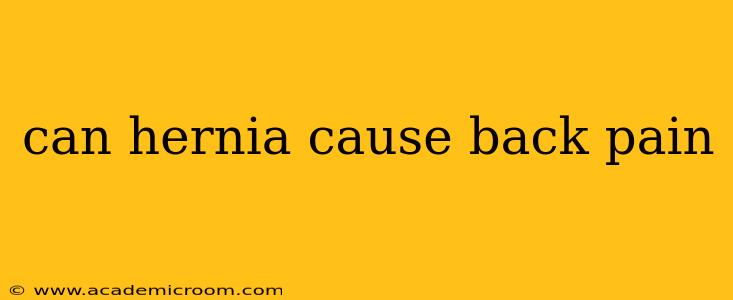Back pain is a common ailment, affecting millions worldwide. While many causes exist, from muscle strains to more serious conditions, a hernia is sometimes implicated. But can a hernia actually cause back pain? The answer is nuanced and depends on the type and location of the hernia. Let's explore the connection between hernias and back pain in detail.
What is a Hernia?
Before we delve into the relationship with back pain, let's briefly define a hernia. A hernia occurs when an organ pushes through a weakness in the surrounding muscle or tissue. This can happen in various parts of the body, but the most common types include:
- Inguinal hernias: These occur in the groin area.
- Femoral hernias: Also located in the groin, but slightly lower than inguinal hernias.
- Hiatal hernias: These involve the stomach pushing through the diaphragm.
- Incisional hernias: These develop at the site of a previous surgical incision.
- Spinal hernias (disc herniations): This is a specific type of hernia affecting the intervertebral discs in the spine. This is the type most directly related to back pain.
Can an Inguinal or Femoral Hernia Cause Back Pain?
While inguinal and femoral hernias are primarily felt in the groin area, they can sometimes cause referred pain. This means the pain is felt in a location different from the source. In some cases, this referred pain might radiate to the lower back, although it's less common than groin pain. The pain is usually caused by the pressure and irritation of the hernia on surrounding nerves.
How Can a Spinal Hernia (Disc Herniation) Cause Back Pain?
A spinal hernia, also known as a disc herniation, is a significant cause of lower back pain. The intervertebral discs act as cushions between the vertebrae in your spine. When a disc herniates, the soft inner material (nucleus pulposus) pushes through a tear in the tough outer layer (annulus fibrosus). This can put pressure on nearby nerves, leading to:
- Localized pain: Pain directly at the site of the herniation.
- Radiating pain (sciatica): Pain that shoots down the leg, often following the sciatic nerve pathway. This is a common symptom.
- Muscle weakness: Weakness in the leg or foot muscles.
- Numbness or tingling: In the leg or foot.
The severity of back pain from a disc herniation varies greatly depending on the location and extent of the herniation, as well as the individual's sensitivity to pain.
What Are the Symptoms of a Hernia?
The symptoms of a hernia depend on its location and severity. However, some common signs include:
- A bulge or lump: Visible or palpable at the site of the hernia.
- Pain: Can range from mild discomfort to severe pain, depending on the location and pressure on nerves.
- Discomfort: A feeling of pressure or heaviness.
It's crucial to consult a healthcare professional for diagnosis and treatment, as self-treating can be harmful.
When Should I See a Doctor About Back Pain?
You should seek medical attention if your back pain:
- Is severe or persistent.
- Is accompanied by numbness, tingling, or weakness in the legs or feet.
- Worsens with time.
- Is accompanied by fever or unexplained weight loss.
- Is associated with bowel or bladder dysfunction.
How is a Hernia Diagnosed?
Diagnosis usually involves a physical examination, where the doctor will check for bulges or lumps and assess your range of motion. Imaging tests, such as X-rays, CT scans, or MRIs, may be necessary to confirm the diagnosis and determine the severity of the hernia.
How is Hernia-Related Back Pain Treated?
Treatment options for hernia-related back pain depend on the type and severity of the hernia and the individual's symptoms. Conservative treatments, such as rest, pain medication, physical therapy, and bracing, are often the first line of defense. Surgery might be considered in cases of severe pain, nerve compression, or complications.
Can Other Conditions Mimic Hernia-Related Back Pain?
It's vital to remember that many conditions can cause back pain, including:
- Muscle strains and sprains: These are common causes of temporary back pain.
- Arthritis: Degenerative joint disease can cause chronic back pain.
- Spinal stenosis: Narrowing of the spinal canal can put pressure on nerves.
- Spondylolisthesis: One vertebra slips forward over another.
A thorough medical evaluation is crucial to determine the exact cause of your back pain and receive appropriate treatment. Do not attempt self-diagnosis.
This information is for educational purposes only and should not be considered medical advice. Always consult with a healthcare professional for any health concerns or before making any decisions related to your health or treatment.
